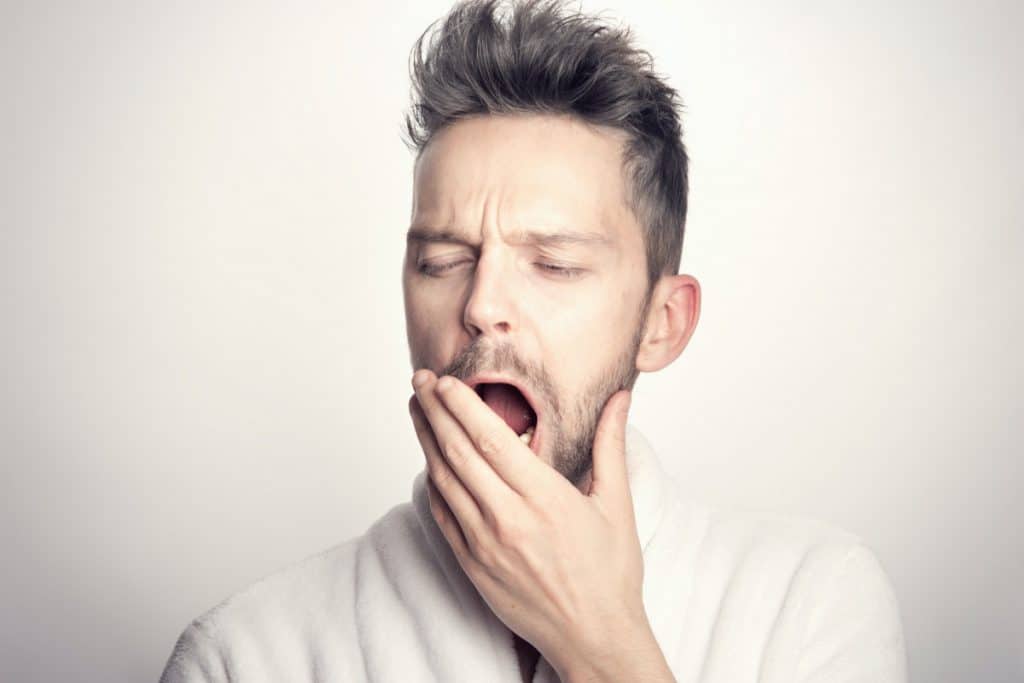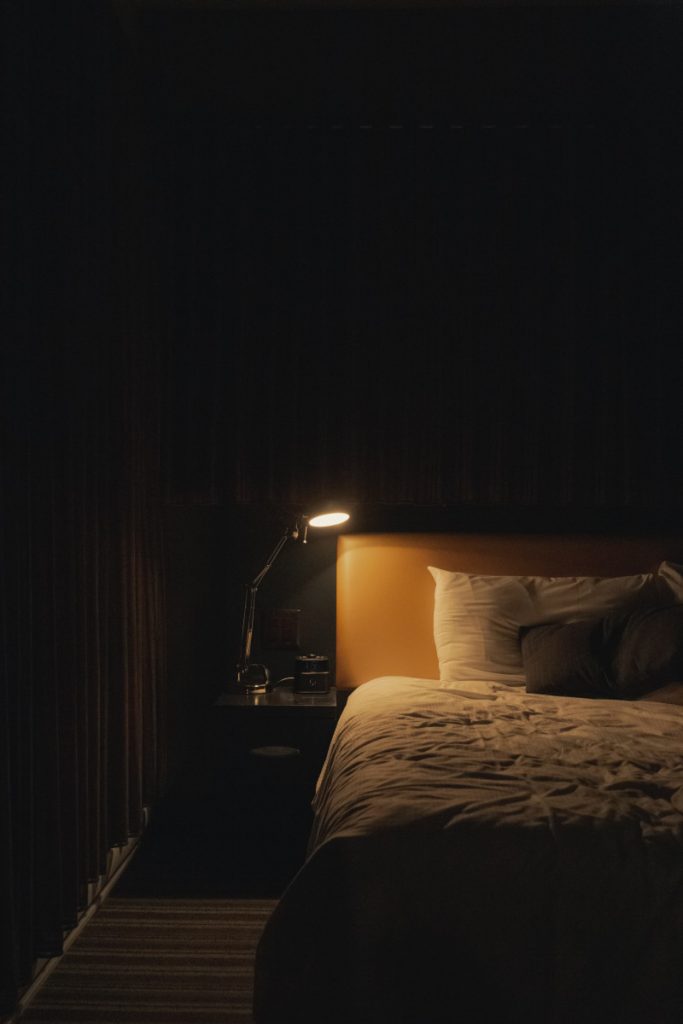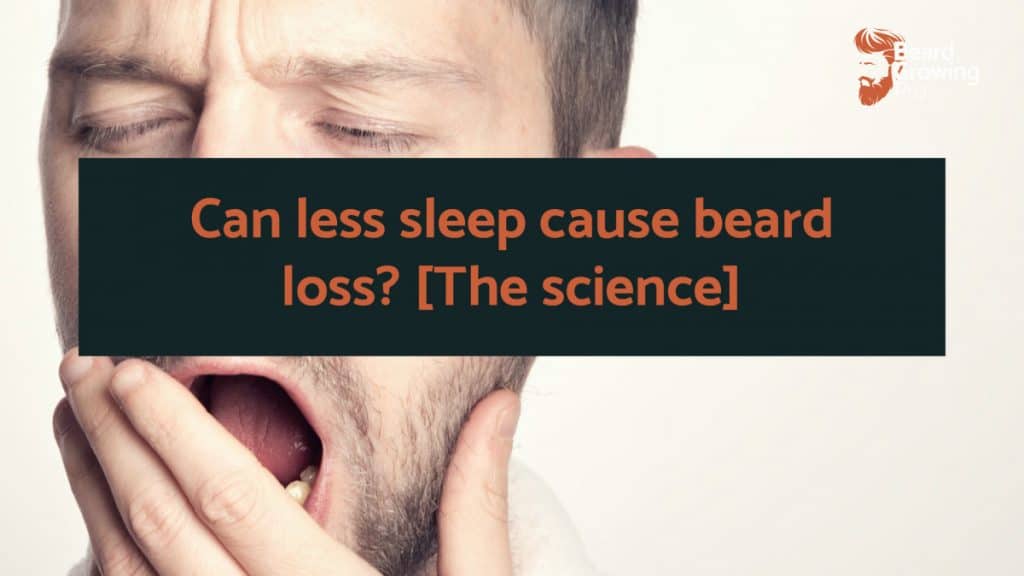Sleep is a very important part of maintaining a healthy body. Chronic sleep deficiency which is either an inadequate amount of sleep or sleep that is out of sync with your circadian rhythm is a key factor in determining your health status. There is no doubt that the lack of sleep contributes to a number of important fundamental changes in your immune system and neurology that play a role in disease development.
A study in 1987 looked at the effect of sleep deprivation on beard hair growth and found a 19% decrease in beard growth after sleep deprivation for 48 hours. A lack of sleep can also result in cardiovascular, metabolic, and testosterone production issues which can cause an issue with your beard.
In this article, only to go over everything you need to know about sleep and I have delved into the scientific research in order to find out if there is a relationship between a lack of sleep and effects that may influence beard loss.
A lack of sleep can cause a load of issues
There are not very many studies about beard loss and sleep deprivation.
BUT…
A study relating sleep and beard growth!
This study does not directly talk about beard loss but it is an interesting insight into the effects of sleep on the capacity of the human body to look after a beard.
I found an article from 1987 which looked at the effect of sleep deprivation on beard hair growth in men.
As part of the study, 10 young men underwent sleep deprivation for 48 hours which resulted in a 19% decrease in their beard hair growth.
This effect was related to the hormonal disturbance (which is really the decrease of growth hormone release) and the decrease of dihydroxy testosterone or DHT.
In this study, 10 adult men were deprived of sleep during 48 hours stop they are asked to spend the nights of the control at home and to avoid large variations in ambient temperature and they had to go to bed between 10 and 12 PM and refrain from any sexual intercourse – which would affect the testosterone levels in the body.
During the deprivation the subjects remained in the lab listening to music and were kept awake for 48 hours.
This study highlights the importance of sleep on the regulation and production of growth hormones and DHT. The scientific literature is full of really interesting and detailed studies about the effect of the lack of sleep on the human body. We can use this information to determine whether or not sleep would likely cause issues with your beard growth and providers with some insight into what we can do to fix it.
Sleep and health
There is no doubt that sleep is essential for our health and survival. Interestingly, rats that were deprived of sleep die within 2 to 3 weeks and sleep deprivation has demonstrated that it has noticeable changes on the hormone and metabolic systems including immune function.

A study, published in 2002 in the journal Sleep indicated that there may be an optimum amount of sleep at around seven hours. They collected data from 636,095 men and 480,841 women in a cancer prevention study. Both men and women with the usual sleep duration of about seven hours had the best survival.
Sleep deprivation can cause immune response mechanisms to become activated. Antioxidant defence responses are also decreased as a consequence of sleep deprivation and therefore the body’s ability to remove molecules that promote cell damage (such as free radicals and oxygen reactive species) is reduced.
We know that eating a variety of antioxidants can help protect the production of beard hairs by protecting the cells at the base of the hair root which generate hair growth.
The good news is that recovery is possible by sleeping and restores antioxidant activities in both the liver and the heart.
Both short-term and long-term sleep deprivation causes cell stress in the brain that leads to all sorts of problems. In order to restore the normal cellular function and prevent cell death it is important to get a good amount of sleep.
Here are some specific examples of how sleep affects very important aspects of your body and therefore your beard production and maintenance.
There is no doubt in my mind that a healthy body is much better at producing beard hair than a body that is undergoing cellular stress caused by sleep deprivation.
Cardiovacular
In general, the science suggests that an average of 7 to 8 hours of sleep per night is associated with the lowest risk and incidence of cardiovascular diseases.
This means that your body has the best potential of delivering nutrients to your entire body including your beard. Short sleep duration has been associated with a greater risk of developing heart disease and stroke. If you are a shift worker it has been found to increase cardiovascular issues.
Keeping your body, and your metabolism, ticking along in a healthy manner is absolutely fundamental to keeping your beard looking and feeling great.
Having poor cardiovascular health is certainly one way that you could be harming your beard and causing it to become weaker and more prone to damage.
Testosterone
A study in 2004 looked at the relationship between sleep disorders and the amount of testosterone in men. If we are going to have a look at the growth rate of hair we should understand the importance of sleep on the levels of testosterone so that we can be sure that the growth of the hair is not inhibited by the amount of testosterone present.

Testosterone is produced throughout the day. They are higher upon waking and D creased to a low point at the end of the day. So, from this we know that you need to get a good nights sleep to have a good amount of testosterone at the beginning of the day. There are bursts of testosterone production that occur about every 90 minutes or so throughout the day, as well.
As you are sleeping testosterone levels begin to increase with the onset of sleep. And, particularly in young men, they reach a peak of testosterone in the first rapid eye movement sleep episode and remain at that level or until they wake up.
You need to be asleep for at least three hours (with a normal sleep pattern) to see the increase of testosterone associated with sleeping.
So, even though we know that getting a good night sleep is instrumental in determining the amount of testosterone that is in the body.
Metabolism
A study that was published in 2018 looked at the effects of light at night on metabolism. Because life on earth has evolved during the past several billion years under relatively bright days and dark night conditions the widespread adoption of electric lights could be affecting your metabolism.
In this article they looked at night shift workers and their elevated risk for metabolic disorders and also looked at evidence from animal studies.
Night shift workers have a higher chance of being obese and having a dis-regulated metabolism that they presume is a direct result from having a disrupted circadian rhythm.
This study found that any interruption to your sleeping with light can quickly affect your metabolism and cause you to put on weight (this means your metabolism is lowered) however, you can increase your metabolism again by exercising and so any issues that you have with sleep patterns can easily be undone with exercise.
Another study published in 2009 looked at the metabolic rate and fuel utilisation during sleep which was assessed by a whole-body indirect calorimetry method – this just means they had a massive air tight room and measured how the carbon dioxide and other gases changed throughout the course of the night.
By looking at the carbon dioxide concentration they were able to infer the metabolism of the person in the room.
It was found that energy expenditure was greatest during the rapid eye movement portion of the sleep than in the later stages.
So, the only time in which you may have a greater metabolic rate is during the short rapid eye movement part of sleep and whether or not that has a significant effect on the rate of your beard hair growth has yet to be determined.
Beard accidents
There’s no doubt that sleep deprivation makes your ability to think and perform at your best much harder.
Owning a beard requires you to take care of it every single day. If you are sleep deprived you are much less likely to look after your beard or care for it in a less attentive way.
Your beard, therefore, may be falling out because you do not have the mental capacity to look after it as well as you used to. My daily beard routine only takes me 10 minutes but, if I am sleep deprived, I certainly rush through it and I don’t give my beard the care and attention it needs. Washing and putting in products like beard oil and beard butter certainly keeps my beard much stronger than if I was to ignore that part of the routine altogether.
All relate to your beard growth!
The important thing about all of these studies is that they show the detrimental effects of getting less sleep on your body’s over all health and well-being.
Your beard requires you to look after your body so that it can grow at its best. Even the smallest amount of sleep deprivation can cause cellular stress which may cause your beard to not grow as fast or be more prone to damage.
In extreme cases of sleep deprivation I am in no doubt that the beard would be affected to the point that it would fall out readily and not be replaced by healthy hair growth as in the case of the natural hair growth cycle.
Can beard hair loss due to lack of sleep be reversed?
A study in mice found that hair follicle stem cells contain a circadian clock which is responsive to hormones. Disruption of this hormonal system through lack of sleep can be detrimental to your beard.
The question stands – if you then get a good nights sleep are you able to reverse some of these detrimental effects?
The good news is that sleep deprivation is a form of stress that can be reversed by simply getting more sleep.
Sleep stress causes a temporarily hair loss condition that is easy to reverse.
If, however your underlying issues for hair loss are based in genetics, or other issues you may not be able to reverse your beard hair loss simply by getting more sleep.
Besides sleep there are a huge number of things that can influence your beard growth – this includes genetics, changes in hormones, medications, diseases, and stress and anxiety. If you get a good nights sleep you also need to remember that you need to look after your health holistically to ensure that your beard is able to grow strong and healthfully.
How to get a good night sleep
There are a lot of factors that can determine whether or not you have a good night’s sleep. Lots of factors such as work stress, family responsibilities, there is no wonder that sometimes even if you are absolutely exhausted you cannot simply just go to sleep.
Here are some simple tips which can help you get a good nights sleep and look after your beard as best as you can:
- Stick to a sleep schedule – you need to set aside no more than eight hours for a good night’s sleep. The science recommends that you sleep for at least seven hours but most people don’t need any more than eight hours in bed to achieve seven hours of good sleep.
- Eat and drink well – do not go to bed hungry or absolutely stuffed. Avoid heavy and large mills within a couple hours of bedtime and foods that contain nicotine, caffeine, alcohol also need to have completely been removed from your system to get a good nights sleep.
- Create a restful environment – create a room that is dark, quiet, and cool. Avoid using any gadgets or devices in the bedroom to prepare your body for sleep. Doing calming activities before bedtime like taking a bath or using relaxation techniques such as meditation might help you sleep better.
- Don’t nap – if you have problems getting to sleep at night you should avoid daytime napping. If you can help yourself limit yourself to 30 minutes and avoid doing it too late in the day.
- Get moving – regular physical activity can actually help you sleep better. Don’t do it too close to bedtime and make sure that it is vigourous enough to raise your heart rate for 15 minutes.
- Learn meditation – I know that I have benefited a lot from learning how to meditate and I use the meditation apps headspace, calm, and insight timer to learn how to mindfully meditate. Using breathing techniques I am very quickly able to bring under control any issues with anxiety or stress.

Summary: Can less sleep cause beard loss?
There is no doubt that getting less sleep wreaks havoc on your body and beard. In this article, we have gone through everything you need to know about beard growth, loss and sleep.
You should aim to get at least seven hours of sleep a night in a nice environment to keep your beard and body as healthy as possible.



